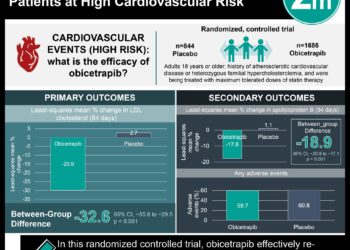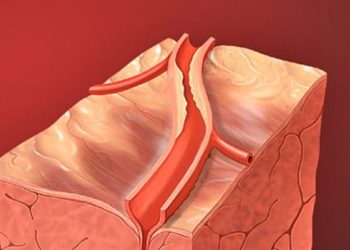Reducing LDL-C reduces subsequent cardiovascular risk
1. Medications that lower low-density lipoprotein cholesterol levels, including statins and non-statins alike, provided similarly reduced risks of major vascular events.
2. Greater reductions in low-density lipoprotein cholesterol were associated with lower rates of major vascular events.
Evidence Rating Level: 1 (Excellent)
Study Rundown: Based on numerous studies, the clinical benefit of reducing low-density lipoprotein cholesterol (LDL-C) with statin medications has been well established. However, there is less evidence to show such direct reductions in major vascular events when using non-statin LDL-C-lowering drugs, like ezetimibe, fibrates, and others. The purpose of this systematic review and meta-analysis was to evaluate the association between reduced LDL-C levels and subsequent cardiovascular health while using either 1) statin therapies (which upregulate LDL-C receptors directly), 2) non-statin therapies that indirectly upregulate LDL-C expression (like diet, bile-acid sequestrants, ileal bypass surgery, and ezetimibe), and 3) other interventions (such as fibrates, niacin, etc.).
The results of the study revealed that a reduction in LDL-C levels, regardless of the mechanism, reduced major vascular events, and there was no significant differences in cardiovascular risk between the groups. The absolute amount of LDL-C reduction was positively associated with greater reductions in the risk of major vascular events in both primary and secondary prevention trials. While this study confirms that the degree of LDL-C reduction is an important indicator of clinical benefit, it is limited in several ways. First, it relied on clinical trials conducted over the past 50 years, and specific trials are limited in terms of baseline therapies and patient populations. Another issue is that the cardiovascular health measures were different across the studies, making direct comparisons of clinical benefit difficult.
Click here to read the study published in JAMA
Relevant Reading: National lipid association recommendations for patient-centered management of dyslipidemia
In-Depth [systematic review and meta-analysis]: A total of 312 175 participants representing 39 645 major vascular events were included in this meta-analysis of 49 trials between 1966 and 2014. The relative risk (RR) for major vascular events per 1-mmol/L reduction in LDL-C level was 0.77 (95%CI 0.71-0.84; p < 0.001) for statins and 0.75 (95%CI 0.66-0.86; p = 0.002) for established non-statin interventions that work primarily via upregulation of LDL-C receptor expression. There were no significant difference between these two groups (between-group difference, p = 0.72). For the third group of medications (i.e. other interventions), the observed RRs vs the expected RRs based on the degree of LDL-C reduction in the trials were 0.94 vs 0.91 for niacin (p = 0.24); 0.88 vs 0.94 for fibrates (p = 0.02), 1.01 vs 0.90 for cholesteryl ester transfer protein inhibitors (p = 0.002); and 0.49 vs 0.61 for proprotein convertase subtilisin/kexin type 9 inhibitors (p = 0.25). In terms of absolute reduction and subsequent reduction of major coronary events in primary prevention trials, there was a 1.5% lower event rate for each 1-mmol/L lower LDL-C level (p = 0.008). For secondary prevention trials there was a 4.6% lower event rate for each 1-mmol/L lower LDL-C level (p < 0.001).
Image: PD
©2016 2 Minute Medicine, Inc. All rights reserved. No works may be reproduced without expressed written consent from 2 Minute Medicine, Inc. Inquire about licensing here. No article should be construed as medical advice and is not intended as such by the authors or by 2 Minute Medicine, Inc.









